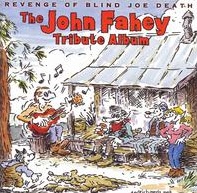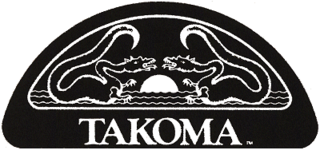
Takoma Records was a small but influential record label founded by guitarist John Fahey in the late 1950s. It was named after Fahey's hometown, Takoma Park, Maryland, a suburb of Washington, D.C.
Peter Lang is an acoustic guitarist who recorded for Takoma Records with John Fahey and Leo Kottke.

The Transfiguration of Blind Joe Death is a 1965 album by American fingerstyle guitarist and composer John Fahey. Originally issued in a hand-lettered edition of 50, it was Fahey's first album to be released by a label other than his own Takoma Records. As with all of Fahey's independently released early albums, it had little critical recognition upon release. The album has grown in stature since its reissue on CD in 1997 and is now highly regarded critically. It was Fahey's fourth album to see release, though after his fifth album, The Great San Bernardino Birthday Party & Other Excursions, was labeled Guitar Vol. 4, reissues of The Transfiguration of Blind Joe Death were subtitled John Fahey, Volume 5.
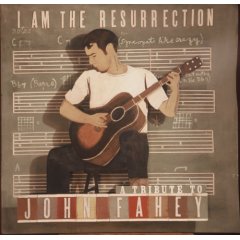
I Am the Resurrection: A Tribute to John Fahey is a tribute album to guitarist John Fahey released in 2006. The album's title is taken from the title of the third track of his album The Transfiguration of Blind Joe Death.
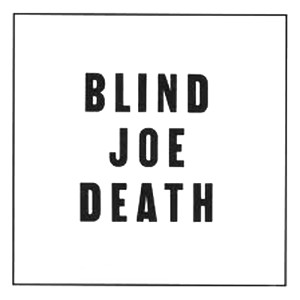
Blind Joe Death is the first album by American fingerstyle guitarist and composer John Fahey. There are three different versions of the album, and the original self-released edition of fewer than 100 copies is extremely rare.

John Aloysius Fahey was an American fingerstyle guitarist and composer who played the steel-string acoustic guitar as a solo instrument. His style has been enormously influential and has been described as the foundation of American Primitive Guitar, a term borrowed from painting and referring mainly to the self-taught nature of the music and its minimalist style. Fahey borrowed from the folk and blues traditions in American roots music, having compiled many forgotten early recordings in these genres. He would later incorporate 20th-century classical, Portuguese, Brazilian, and Indian influences into his work.

The Voice of the Turtle is the seventh album by American guitarist John Fahey. Recorded and released in 1968, it is considered one of his more experimental albums, combining not only folk elements, but shreds of psychedelia, early blues, country fiddles, ragas, and white noise. The album had many reissues with various track listings, jacket designs and mismatched titles.

Michael Gulezian is an American composer and fingerstyle guitarist. He is noted for dramatic compositions, a penchant for manipulating metre, an affinity for open tunings, and an unconventionally free two-handed technical approach. Gulezian's use of bottleneck slide on 12-string guitar, coupled with his command of reverse analog reverbs have made his recordings notable for their dream-like sonic atmosphere. Gulezian inhabits a musical territory between his mentor John Fahey and Gulezian's friend and colleague Michael Hedges.
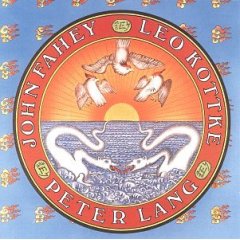
Leo Kottke/Peter Lang/John Fahey is a split album by American guitarists Leo Kottke, Peter Lang, and John Fahey, released in 1974.

Death Chants, Breakdowns & Military Waltzes is a 1963 album by American fingerstyle guitarist and composer John Fahey. Various sources show either a 1963 or 1964 original release. It was Fahey's second release and the first to gain a national distributor.
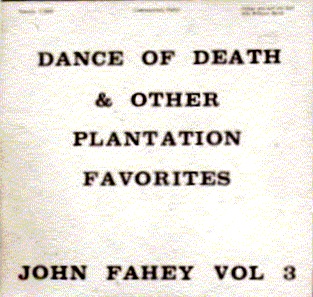
The Dance of Death & Other Plantation Favorites is the third album by American fingerstyle guitarist and composer John Fahey, released in 1965. The 1999 reissue contained four previously unreleased tracks.

Fare Forward Voyagers is an album by American fingerstyle guitarist and composer John Fahey, released in 1973. It contains three songs, one comprising a complete side of the original LP.
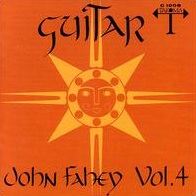
The Great San Bernardino Birthday Party & Other Excursions is an album by American fingerstyle guitarist and composer John Fahey, released in 1966. The cover simply labels the album Guitar Vol. 4 while the liner notes label it The Great San Bernardino Birthday Party & Other Excursions. The title never appeared on the record labels themselves. It marked the beginning of Fahey's interest in his recording of experimental soundscapes and sound effects. Despite Fahey's distaste for the 1960s counterculture, it is his release most often referred to as psychedelic.

The Best of John Fahey 1959–1977 is a compilation album by American fingerstyle guitarist and composer John Fahey, released in 1977. The songs are collected from four of Fahey's dozen or so releases up to that point.

John Fahey Visits Washington D.C. is an album by American fingerstyle guitarist and composer John Fahey, released in 1979.

City of Refuge is an album by American fingerstyle guitarist and composer John Fahey, released in 1997. It was his first original release in over five years and helped start his career resurgence.

Railroad is an album by American fingerstyle guitarist and composer John Fahey, released in 1983. It was originally released as Railroad 1 by mistake. The Shanachie Records reissue is correctly labeled as Railroad. It was his last principal recording for Takoma Records, the label he founded in 1959.
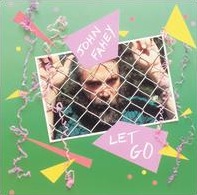
Let Go is an album by American fingerstyle guitarist and composer John Fahey, released in 1984. It was his first release on the Varrick label after over 25 years on his own label Takoma, as well as a few releases on other labels.

Georgia Stomps, Atlanta Struts and Other Contemporary Dance Favorites is a live album by American fingerstyle guitarist and composer John Fahey, released in 1998. It was the second and last live album he recorded and released during his lifetime.

Terry Robb is a Canadian fingerstyle guitarist, composer, arranger and record producer living in the United States. He plays electric and acoustic guitar, and is associated with the American Primitive Guitar genre through his collaboration with steel string guitarist John Fahey. He is a member of the Oregon Music Hall of Fame and Cascade Blues Association Hall of Fame, and was honored with the eponymous "Terry Robb" Muddy Award for Best Acoustic Guitar in 2011. His original compositions draw on the Delta blues, ragtime, folk music, country music and jazz traditions.
